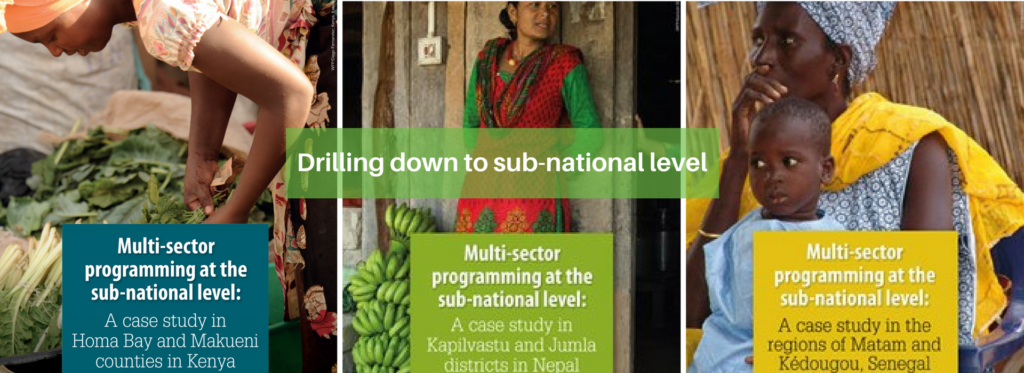Multi-sectoral programming at the sub-national level: A case study in Matam and Kédougou regions in Senegal
[vc_row row_type=”row” text_align=”left” css_animation=””][vc_column][vc_column_text custom_options=””] There is a shift towards devolved governance in many countries; there has been little examination of its impact on multi-sector nutrition programming. This case study forms part of a series created by ENN that describe how multi-sectoral programme implementation works…
[vc_row row_type=”row” text_align=”left” css_animation=””][vc_column][vc_column_text custom_options=””]
There is a shift towards devolved governance in many countries; there has been little examination of its impact on multi-sector nutrition programming. This case study forms part of a series created by ENN that describe how multi-sectoral programme implementation works at the sub-national level in three ‘high achieving’ SUN Countries: Senegal, Kenya and Nepal. In each country, two districts were explored in depth, and within each, a specific multi-sectoral programme examined. This case study examines Senegal, more specifically Kédougou region, and the Integrated Nutrition Project in Kolda and Kédougou (PINKK), and the Matam region, and the USAID-funded Yaajeende Project.
The two regions examined in the report Multi-sector programming at the sub-national level: A case study in the regions of Matam and Kédougou, Senegal were chosen as they demonstrate significant regional variation in patterns of undernutrition in the country. In Matam there is a high burden of wasting, well above the national average, while Kédougou has one of the highest stunting rates in the country.
Alongside this case study, a video with ENN’s Ambarka Youssoufane has been created, to put the spotlight on how one multi-sectoral programme is being implemented at the sub-national level, in practice, in Senegal.
[/vc_column_text][vc_column_text custom_options=””]More information:
ENN Media Hub: https://www.ennonline.net/mediahub/video/senegalmsp[/vc_column_text][vc_separator type=”normal”][/vc_column][/vc_row][vc_row row_type=”row” text_align=”left” css_animation=””][vc_column width=”1/2″][vc_column_text custom_options=””]
Download the report

[/vc_column_text][/vc_column][vc_column width=”1/2″][vc_column_text custom_options=””]
Watch and learn
[/vc_column_text][/vc_column][/vc_row][vc_row row_type=”row” text_align=”left” css_animation=””][vc_column width=”1/2″][vc_column_text custom_options=””]
This case study looks at the region of Kédougou with the Integrated Nutrition Project in Kolda and Kédougou (PINKK), and in the Matam region with the USAID-funded Yaajeende Project.
Download the case study English | Français
[/vc_column_text][vc_column_text custom_options=””][/vc_column_text][/vc_column][vc_column width=”1/2″][vc_column_text custom_options=””]This video accompanies the report Multi-sector programming at the sub-national level: A case study in the regions of Matam and Kédougou, Senegal and explores how one multi-sectoral programme is being implemented at the sub-national level in Senegal. [/vc_column_text][/vc_column][/vc_row][vc_row row_type=”row” text_align=”left” css_animation=””][vc_column][vc_column_text custom_options=””]
EXPLORING MULTI-SECTORAL PROGRAMMING AT THE SUB-NATIONAL LEVEL IN SENEGAL, KENYA & NEPAL

Documentation has often centred around policies, strategies and frameworks nationally and guidance available is still fairly generic and “top down”. In April 2018, ENN published a series of case studies on multi-sector nutrition programming at the sub-national level as part of its Knowledge Management (KM) work under the DFID funded TAN Programme (supporting learning within the Scaling Up Nutrition Movement). ENN’s primary objective for this work was to construct ‘case studies’ with detailed descriptions at the sub-national and implementation levels.
This work comprises three country case studies from selected “high achieving” SUN countries with a strong track record in championing and improving undernutrition – Kenya, Nepal and Senegal. These country pieces are accompanied by a synthesis document that draws out some of the key lessons from these case studies. The three country pieces are based on fieldwork and interviews conducted by ENN’s Regional KM Specialist team in late 2017.
Download the synthesis document here[/vc_column_text][/vc_column][/vc_row]